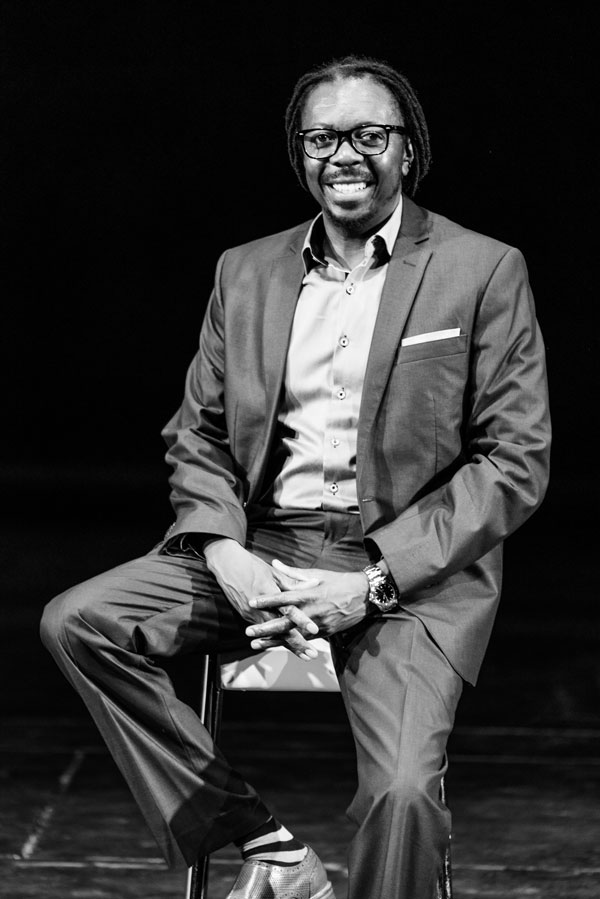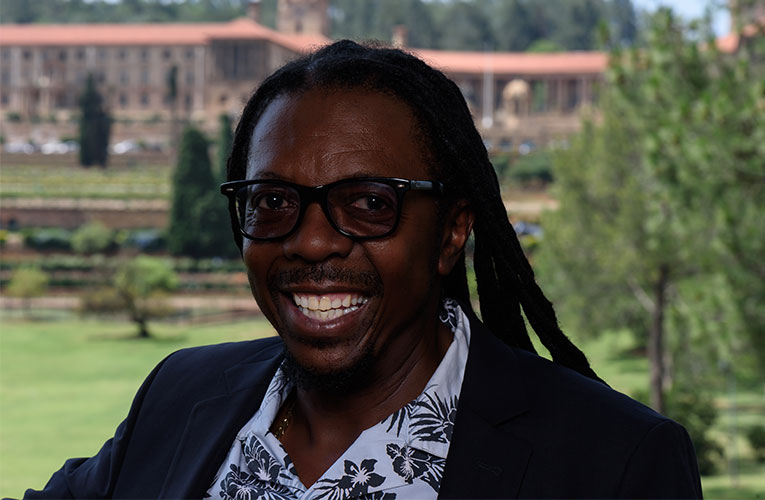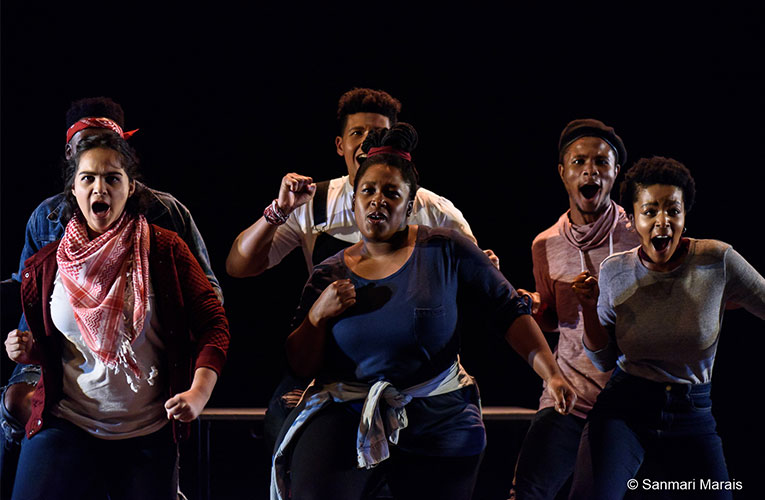Aubrey Sekhabi programming the State Theatre for diverse audiences
Edward Tsumele
About five years ago at the State Theatre after an opening night of one of their shows, audience members and the media were filmed by a crew, made up of mostly student filmmakers commenting about the show and their impressions on the production.

Not only did the crew film the audience and their comments, but the entire show was filmed and archived. Come 2020, five years later, Covid 19 struck and the country went into lockdown starting in March. Theatres such as State Theatre and other arts institutions were negatively affected as they closed their doors to the public, stopped shows before they finished their seasons, and as a result, several artists found themselves indoors and not in the streets as such, due to the lockdown restrictions.
No income and no work. That is the stark reality many artists found themselves in, hungry, unemployed and no income, and in limbo as their places of employment and sources of their income, such as theatres were forced to close their doors.
It is amid this confusion and devastation when the State Theatre went back to their archives, digging deep into this treasure trove of shows that they had recorded to mitigate the effects of Covid 19 on artists by making these shows available to audiences to watch from the comfort and safety of their homes in a pay per view basis. The result was phenomenal, according to playwright Aubrey Sekhabi who is at the helm of programming the five venues of the State Theatre in Pretoria.

We were ahead of time when it comes to the use of digital technology as we had long created content for the digital platforms a long time ago before even people knew about Covid 19. From May 2020 up to now, we have been putting up the content that we filmed a long time ago, as well as livestreaming new content for our audiences,”
— says Sekhabi who holds the artistically influential position of Artistic Director at the State Theatre, in an exclusive interview conducted at the State Theatre in Pretoria yesterday, October 6.

The foresight to film their shows, including hit productions such as Marikana, Freedom, and Angola among others, saved what could have been a dire situation that has seen many theatres leave artists in limbo with no income and no opportunity to earn a living for six months since lock down took effect.

“So far we have managed to engage and pay 500 artists during lock down, and this week alone, we are engaging the services of 110 artists, making sure that they earn an income. We continue to film music and theatrical productions and put them on our digital platforms. The response has been huge, including giving an opportunity to people, even from outside the country, to watch these pay per view shows, earning artists a reasonable income.
And so shows have been going on at State Theatre, even during lockdown. The good thing is pay per view does not cater for complementary tickets as they are not offered at all. Some of the productions have done pretty well, for example, witnessing audiences of between 11 000 (Freedom) and 15 000 (Marikana), buying tickets to watch shows on the digital platforms,” says Sekahbi, one of the most prominent and successful theatre directors to emerge out of this country.
A Wits drama graduate, he is also a prolific writer, besides directing shows and programming the State Theatre’s five venues and festivals, including the popular Vavasati Festival.

Sekhabi is in fact the main brains behind the State Theatre’s tight artistic programming that sees it cater for diverse audiences from around Tshwane and other part of the province. And as it is often the case, catering for such a diverse audience with different cultural roots, interests and theatrical taste poses a huge challenge to an artistic director.
Sekhabi however insists that to him that is not a problem at all. For example, going back as far as before 1994, the audiences for State Theatre were mainly white people of Afrikaans cultural background, but came democracy the theatre had to expand the scope of its programming to also cater for new audiences in an inclusive manner, and that posed the risk of losing loyal audiences and tragically even failing to attract the new audiences in a transforming society.
“The good thing is that we never attempted to alienate certain audiences in our programming in the first place as this theatre has five venues running shows at any given time. The fact that one might be in another venue watching his or her friend’s show, does not mean that other venues are not running shows that might not be your friend’s show. We are therefore able to cater for everyone, including developing new theatre voices and new audiences through the way we programme these five venues,” argues Sekhabi.
And to confirm their superior programming and putting up shows that are critically acclaimed, the State Theatre this year won 13 Naledi Awards, and some of the shows were directed by young theatre directors that have come through the theatre’s mentorship and development programme for young directors. Although Sekhabi admits that Covid-19 affected the theatre’s programming, especially when it comes to live shows, the show as they say, has in fact been going on at the State Theatre as shows were livestreamed, lockdown or no lockdown. Currently at level 1 of lockdown, the place has life.
In fact during CITYLIFE/ARTS visit yesterday, the place was a hive of activity as a film crew was busy shooting a jazz artist whose show, complete with an interview, will be up for audiences to watch and pay per view soon. Her name is Keamogetswe Moeketsane. When we arrived she was being interviewed television style by Ncasmisa Nqana. Believe me the set design was no different to that of a classy TV studio with several cameras filming the interview from all angles at the same time.
“Of course when we started filming years ago, we struggled to get it right sometimes. But now the quality is superb. We film hip hop and jazz musicians as well that we post on our digital platforms for audiences to buy tickets and watch. This way, we are able to also give an opportunity to young artists. One of the things that we do here at the State Theatre is to identify young talent that we groom to become not only directors of note, but also producers, and so far some of the young theatre voices that have emerged from this development programme are theatre directors Sello Maseko and Joseph Komane, who are award winners. The thing though is, to become a successful theatre director, it takes time and dedication. There is no short cut. But the State Theatre is playing its part in identifying young people for development as directors and producers,” Sekhabi says.
Going forward Sekhabi says that the lockdown has also given the State Theatre an opportunity to think hard about future programming.
“We have taken this opportunity to ask ourselves hard questions, and we always do not have answers. What I know though is that live theatre is going nowhere. What we see ourselves doing in future, is to have both live and streamed shows, a hybrid model. The State Theatre council is fully behind us.”
Though Sekhabi did not want to go into details about future shows, he was however able to reveal to CITYLIFE/ARTS that Bopha by veteran playwright Percy Mtwa, is part of the theatre’s future programming plans, and so is a dance piece by well known choreographer Luyanda Sidiya.
“I cannot reveal everything for now as some of the plans have to be endorsed by Council, but the future looks bright at State Theatre as far as the 2021 programming is concerned. We have in recent years repositioned ourselves as a pan African theatre and therefore, there will be collaborations with the rest of the African continent. In fact we had already started to do so, but when Covid 19 came it disrupted some of those collaborations,” he said.










